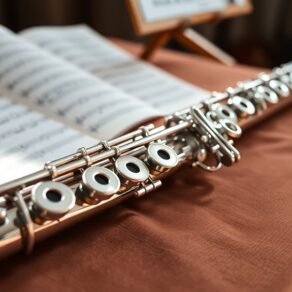In 2025, you'll find several budget-friendly flutes that stand out for their quality and sound. Brands like Yamaha and Gemeinhardt offer excellent options with durable construction suited for beginners and intermediates. Models like the Jean-Paul USA FL-220 and Mendini MFE-300 are praised for their responsive keys and rich tones, making them ideal choices. Key features to evaluate include material type, key design, and overall sound quality. Testing different models can help you find the right fit. Pay attention to maintenance practices as they'll prolong your flute's life. Discover more about the top choices available to enhance your musical journey.
Top Flute Brands to Consider
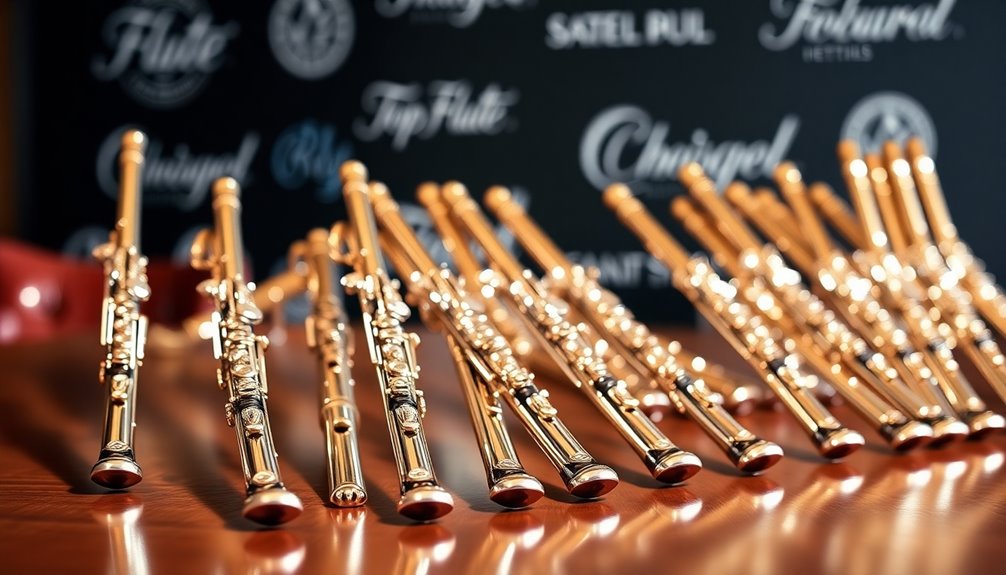
When it comes to choosing a flute, several brands stand out for their quality and affordability. If you're a beginner or looking for a reliable instrument without breaking the bank, Yamaha and Gemeinhardt flutes should be at the top of your list.
These two brands have established themselves as leaders in the flute market, offering a range of models that cater to various skill levels and budgets.
Yamaha flutes are known for their exceptional craftsmanship and consistent performance. They offer a wide range of options, from student models to intermediate flutes, ensuring you'll find something that suits your needs.
The design of Yamaha flutes often emphasizes ease of playability, making them a favorite among new players. You'll appreciate the reliable intonation and smooth tone they produce, which can boost your confidence as you develop your skills.
On the other hand, Gemeinhardt flutes have a solid reputation for durability and affordability. Their instruments are often favored by schools and music programs due to their robust construction and ease of maintenance.
Gemeinhardt flutes provide a warm sound that's appealing to many players, making them an excellent choice for both beginners and those advancing in their flute journey. Additionally, both brands are known for their extended warranties that enhance peace of mind for novice players.
Key Features of Budget Flutes
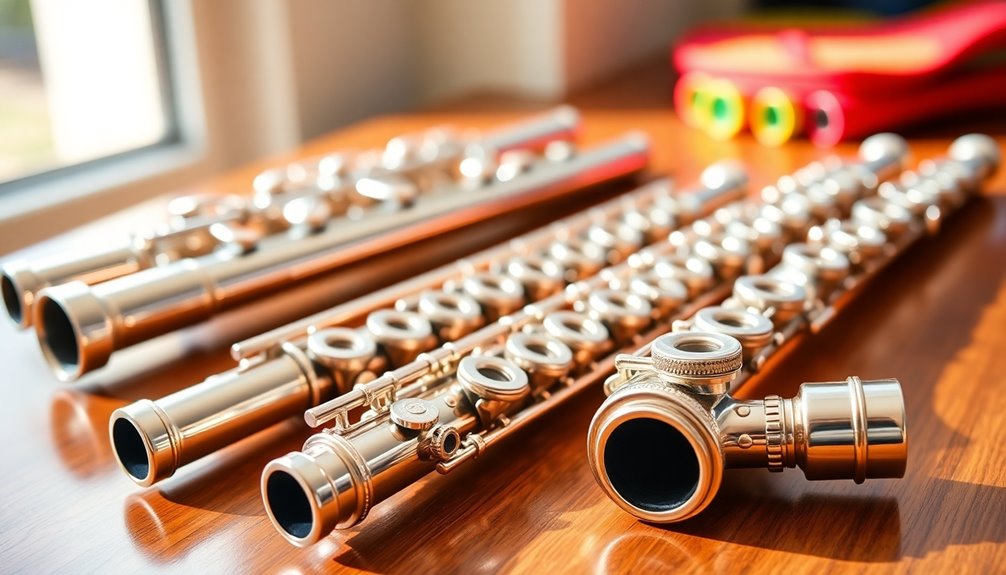
Considering budget flutes, you'll want to pay attention to several key features that can greatly affect your playing experience.
Understanding these aspects helps you make a more informed choice, guaranteeing you find a flute that meets your needs without breaking the bank.
Here are three essential features to keep in mind:
1. Material Types: The materials used in budget flutes can greatly influence both durability and sound quality.
Most affordable options are made from silver-plated or nickel-silver alloys. While these may not provide the same warmth as solid silver, they still deliver a satisfactory tone for beginners or casual players.
2. Key Mechanism: The Key Mechanism should feel smooth and responsive.
Look for flutes with a reliable mechanism that guarantees consistent performance. A sturdy construction will allow for better longevity and ease of maintenance, vital for budding musicians.
3. Sound Quality: While budget flutes won't rival professional-level instruments, you can still find options that produce a pleasant sound.
Pay attention to the flute's intonation and projection. A well-designed budget flute will have a balanced tone across its range, making your practice sessions more enjoyable. Moreover, considering the impact of high-quality flutes can help you appreciate the value even more in your musical journey.
Best Flutes for Beginners
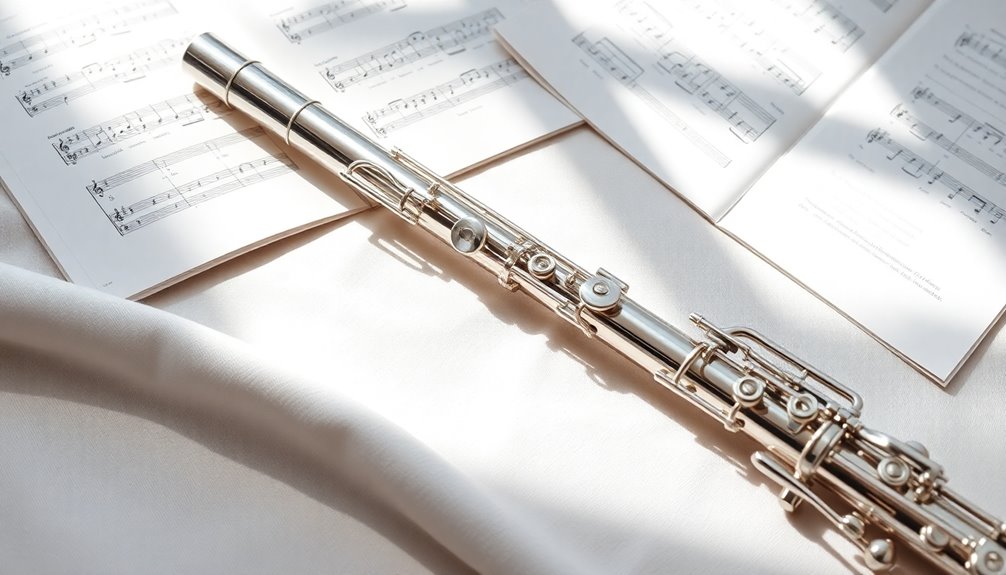
Finding the right flute as a beginner can greatly enhance your learning experience and foster a love for music. When selecting a flute, it's vital to take into account comfort, playability, and sound quality. Look for flutes designed specifically for beginners; they often come with features that support your development of essential beginner flute techniques.
A good beginner flute should have a closed hole design, which makes it easier to play without worrying about finger placement. Brands like Yamaha and Gemeinhardt offer excellent options that balance affordability with quality. These flutes aren't only durable but also provide a warm, rich sound that can inspire you to practice more.
As a new flutist, mastering proper flute maintenance is key to guaranteeing the longevity of your instrument. Regularly swabbing out your flute after each use will prevent moisture buildup, which can damage the pads.
Additionally, avoid exposing your flute to extreme temperatures; this can affect the tuning and overall performance. Choosing a flute made from durable materials like nickel silver can also enhance its lifespan.
Don't forget to schedule periodic check-ups with a professional technician, especially if you notice any issues. This guarantees your flute stays in top condition as you progress.
Embracing these beginner flute techniques and maintenance tips will set you on a path to success. Remember, every musician started somewhere, so don't hesitate to reach out to fellow players and instructors for support.
You're not alone in this journey—your love for music will grow with each note you play.
Affordable Options for Intermediate Players
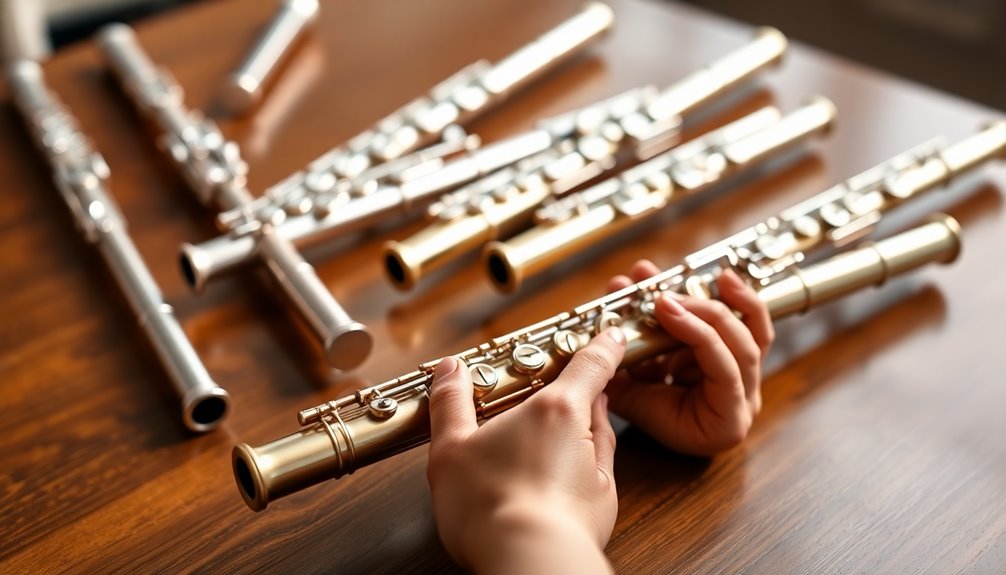
As an intermediate player, you're ready to explore flutes that offer enhanced features without breaking the bank.
You've likely developed your intermediate techniques and want a flute that supports your growth. Affordable options are available that provide both quality and versatility, allowing you to express your musicality without financial stress.
Here are three key features to evaluate:
- Material: Look for flutes made from versatile materials like silver-plated brass or nickel. These options provide a warm tone while remaining budget-friendly.
- Mechanics: Reflect on flutes with open-hole keys or offset G keys. These features enhance playability and allow for more advanced techniques, giving you the flexibility to tackle complex pieces.
- Footjoint Options: A flute with a B footjoint can extend your range, making it easier to play lower notes. This is particularly beneficial as you experiment with various musical styles. Additionally, consider the high-quality construction of the flute as it greatly influences the overall sound quality and playing experience.
Reviews of Notable Models
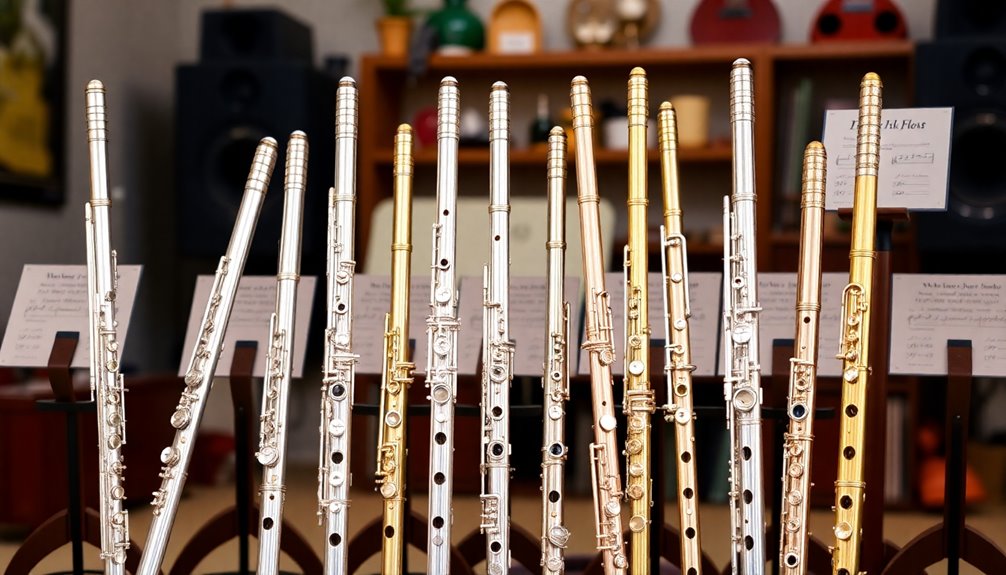
When maneuvering the world of budget-friendly flutes, several models stand out for their exceptional value and performance. One notable option is the Jean-Paul USA FL-220. Users appreciate its responsive keys and rich tone, making it an ideal choice for beginners and intermediate players alike.
In model comparisons, the FL-220 often ranks highly due to its affordability without sacrificing quality.
Another contender is the Mendini by Cecilio MFE-300. This flute is frequently praised for its sleek design and ease of playability. User feedback highlights its consistent sound production and comfortable grip, which can be particularly beneficial for those new to the instrument. Notably, it is recommended for beginners due to its ease of playing and positive user feedback on sound quality.
When compared to other models in the same price range, the MFE-300 offers remarkable durability and sound clarity.
The Yamaha YFL-222, while slightly higher in price, is also worth mentioning. It's known for its excellent build quality and smooth action. Users often comment on its ability to produce a clear, bright sound that enhances performance, making it a worthy investment for those who plan to continue playing.
Lastly, the Glory GS-002 is an affordable option that doesn't compromise on performance. It's lightweight and easy to handle, making it a favorite among users who value portability.
Model comparisons show that the GS-002 stands out for its combination of affordability and functionality, ensuring you feel confident in your choice of flute.
Tips for Choosing the Right Flute
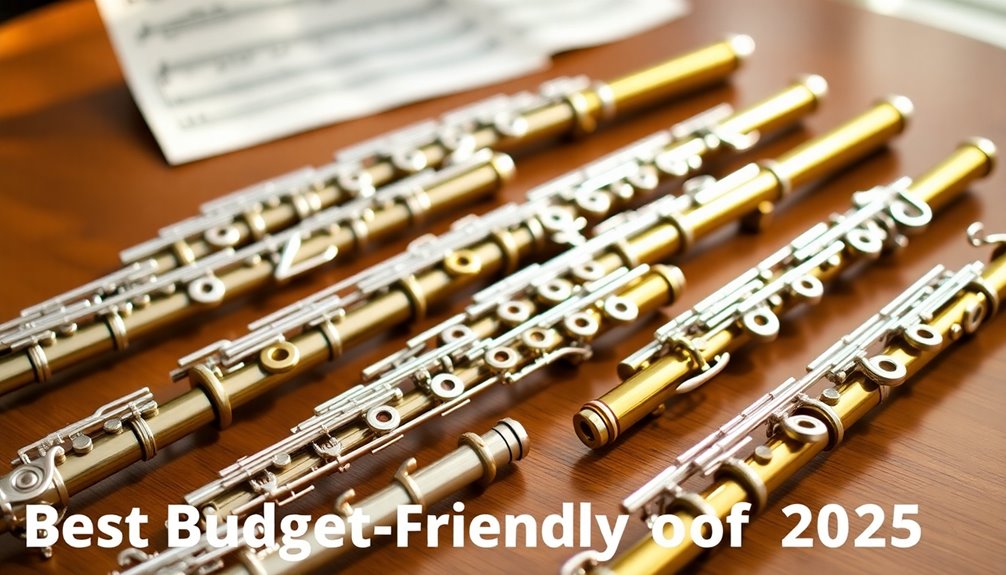
Selecting the right flute can greatly influence your playing experience and development, so it's essential to take into account several key factors before making a purchase. Here are three important considerations:
- Material: Flutes come in various materials like silver, nickel, and plastic. Each affects the instrument's weight and sound quality. A sound quality comparison between materials can help you find what resonates best with you.
- Key Mechanism: Consider whether you want open or closed holes. Open-hole flutes offer more control for advanced techniques, while closed-hole models are often easier for beginners. Your choice here impacts your learning curve.
- Budget: Set a realistic budget. While it's tempting to go for the cheapest option, investing a bit more can yield a significant improvement in quality and longevity, especially if you follow proper flute maintenance tips.
Once you've narrowed down your options, take the time to play different models. Listen closely to their tonal differences and feel how they respond to your breath. Additionally, popular beginner flute brands can provide reliable options that cater to various budgets and preferences.
Don't hesitate to seek advice from teachers or fellow musicians. Their insights can be invaluable in guiding your decision.
Ultimately, the right flute should feel comfortable and inspire you to play. Remember, it's not just about the price tag—it's about finding an instrument that resonates with your musical aspirations.
With careful consideration, you'll discover a flute that feels like an extension of yourself, enriching your musical journey.
Frequently Asked Questions
What Materials Are Budget-Friendly Flutes Typically Made From?
When you're considering budget-friendly flutes, you'll typically find them made from materials like nickel silver, brass, or even plastic.
These materials offer a solid balance between affordability and durability, making them great for beginners. In your materials comparison, keep an eye on how these options withstand wear and tear.
While they may not have the same longevity as higher-end models, they still provide a reliable experience as you develop your skills.
How Often Should I Service a Budget Flute?
You should service your budget flute at least once a year to guarantee it stays in good condition.
Regular maintenance helps prevent issues that could affect your sound quality. Pay attention to signs of wear and tear, and don't hesitate to seek professional help if you notice problems.
Incorporating these flute maintenance tips into your routine will keep your instrument playing beautifully and extend its lifespan.
Can I Find Second-Hand Flutes That Are Budget-Friendly?
Absolutely, you can find second-hand flutes that are budget-friendly!
While new flutes shine with their pristine finish, second-hand marketplaces often offer hidden gems at a fraction of the cost.
Just remember, flute quality varies, so inspect each instrument carefully.
Look for reputable sellers and check for any wear or damage.
With a little patience and research, you can discover a great flute that fits your budget and musical aspirations.
Are There Warranty Options for Budget Flutes?
When considering budget flutes, warranty options can vary greatly among flute brands.
Some manufacturers offer limited warranty coverage, which typically protects against defects in materials and workmanship.
Always check the specific warranty terms before purchasing, as this can give you peace of mind.
Investing in a flute with a solid warranty means you're protecting your investment, ensuring you're supported in case of any issues that might arise during your musical journey.
How Do I Clean and Maintain My Flute?
Did you know that regular flute maintenance can extend its life by up to 50%?
To keep your flute in top shape, use effective flute cleaning techniques like swabbing the inside after each use and gently polishing the exterior with a soft cloth.
Regularly check pads and keys for wear.
Incorporating these maintenance tips won't only enhance your performance but also deepen your connection to your instrument, ensuring you feel at home while playing.
Conclusion
To sum up, finding the right budget-friendly flute can enhance your musical journey without breaking the bank. For instance, imagine a beginner named Sarah who chooses a Yamaha YFL-221, discovering its rich tone and ease of play. This choice not only boosts her confidence but also keeps her motivated to practice. By considering key features, reputable brands, and your skill level, you can select a flute that meets your needs and supports your growth as a musician.



